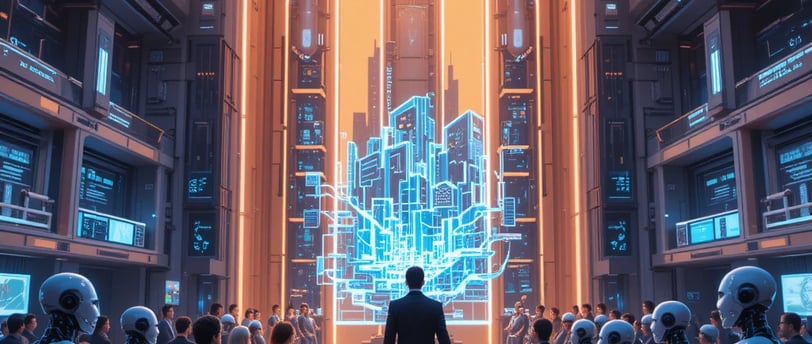AI Leadership Revolutionizes Government Agencies: Embracing Elon Musk's Vision
2/4/20254 min read


AI Leadership Revolutionizes Government Agency with Elon Musk's Vision
In the ever-evolving realm of artificial intelligence (AI), a seismic shift is taking place within government institutions. With trailblazers like Elon Musk setting the tone for groundbreaking innovation, the integration of AI into government operations is becoming more than just a buzzword—it's a revolution. The push to create an AI-dedicated federal agency mirrors Musk's futuristic vision, a shift that could transform how governments leverage technology for public service.
Elon Musk's Role in Shaping AI Policy
Elon Musk, the enigmatic entrepreneur behind Tesla, SpaceX, and OpenAI, has long advocated for cautious yet progressive AI development. Despite his warnings about the risks of AI surpassing human intelligence, Musk's actions reflect his confidence in AI's potential to serve humanity when appropriately governed. His influence is now being felt in Washington, D.C., where discussions about creating a federal AI-focused agency are gaining momentum.
Musk's former lieutenant, Andrej Karpathy, once spearheaded Tesla's AI efforts and is now at the forefront of this government push. With knowledge built on creating revolutionary AI systems, Karpathy is one of several key players working to inject Silicon Valley wisdom into federal intelligence frameworks. Musk's relentless pursuit of AI excellence and ethical transparency is informing discussions that could reimagine the relationship between technology and governance.
What Would a Federal AI Agency Entail?
The concept of a government AI agency is rooted in the desire to regulate, develop, and deploy artificial intelligence in ways that maximize societal benefit while minimizing harm. This agency would engage diverse stakeholders—ranging from tech companies to academic researchers—to create a centralized hub for all AI-related initiatives in the United States.
Core Functions of a Federal AI Agency:
Funding Research: Allocate resources to public and private AI research projects that tackle key areas like healthcare, clean energy, and defense.
Ethical Oversight: Establish standards and practices to ensure AI is developed and deployed responsibly, avoiding harmful biases and ensuring data privacy.
Monitoring and Regulation: Act as a watchdog to oversee AI development, ensuring compliance with legal and ethical frameworks.
Talent Development: Partner with academic institutions to train the next generation of AI experts and ensure U.S. leadership in this critical field.
Bringing Musk's bold vision to life in a government structure would require balancing the dynamic speed of tech innovation with the traditionally methodical pace of bureaucracies. The question remains: can Silicon Valley and Washington truly unite?
Challenges and Opportunities Ahead
Establishing an AI-centric agency presents unique challenges, but the opportunities far outweigh them. Here’s a closer look:
Challenges
Bureaucratic Resistance: Government agencies often struggle to keep up with the rapid advancements of AI. A new agency must tackle inter-departmental silos and outdated processes.
Funding and Resources: Developing cutting-edge AI systems requires significant financial investment, which could spark political debates over budget allocation.
Balancing Innovation with Ethics: Entrepreneurs like Musk are known for their “move fast” mentality, while governments traditionally prioritize meticulous oversight. Striking this balance will be critical.
Opportunities
Global Leadership: By establishing a dedicated AI agency, the U.S. could solidify its position as a global leader in ethical AI development and deployment.
Addressing Public Trust: A federal agency could enhance transparency and trust through clear efforts to enforce accountability in AI practices.
Driving Economic Growth: AI is projected to contribute trillions to the global economy. A federal focus on training, innovation, and deployment could reap significant economic rewards domestically.
With experts like Musk and his protegés bringing their expertise to the table, the U.S. is better prepared to manage these growing pains and chart a course toward a government powered by purposeful, ethical AI systems.
Potential Impact on Public Services
One of the most exciting aspects of this initiative is the potential to improve public services. AI technologies already demonstrate immense potential in sectors like education, public health, and infrastructure management. By embedding responsible AI into government processes, the U.S. could vastly enhance its citizen-facing services. Consider the following examples:
Healthcare
Predictive Analytics: AI could flag potential healthcare crises through real-time analysis of public health data.
Personalized Medicine: Federal healthcare programs could use AI to offer treatments tailored to individual genetic profiles.
Education
Customized Learning: AI-powered tools could adapt lesson plans to suit the unique needs of each student, promoting equitable outcomes.
Digital EduTech: Governments could introduce more AI-enhanced edutech platforms, broadening young people's access to world-class educational content.
Infrastructure
Smart Cities: AI can optimize traffic patterns, reduce energy waste, and enhance public safety in urban centers.
Streamlined Services: Everyday government services, such as obtaining licenses or resolving citizen complaints, could become faster and more efficient through automated systems.
Why Visionaries Like Musk Matter
Elon Musk’s vision matters not just because of his exceptional track record in technology but because of his ability to dream big while considering ethical implications. His outspoken warnings about AI’s potential risks underscore his nuanced understanding of the technology’s double-edged nature. With Musk’s former colleagues at the forefront of this initiative, there’s a unique blend of ambition and caution guiding the conversation.
"We need to legislate the future intelligently," Musk has frequently said, advocating for preemptive rather than reactive measures when it comes to governing disruptive technologies. This emphasis on strategy over improvisation is precisely what’s needed in the emerging discussions about a government AI hub.
The Road Ahead
As the U.S. government considers establishing an AI-centric agency, one thing is clear: the stakes are enormous. The decisions made today could shape the nation’s governance, economy, and global standing for decades to come. With the combined expertise of Silicon Valley trailblazers like Musk and the carefully structured framework of federal agencies, there’s a real opportunity to harness AI’s power for the public good.
In this pivotal moment, a partnership between innovators and policymakers could usher in a new era of government efficiency and innovation. While challenges undoubtedly exist, Musk’s vision for responsible yet revolutionary AI use offers a compelling roadmap for the future.
The question is no longer if AI will transform governance—it’s how and when. With Musk-inspired ambition and Silicon Valley brilliance in action, the revolution is already underway.
```
Artistry
Explore our captivating AI-generated art and videos.
Gallery
Creativity
+
© 2025. All rights reserved.
